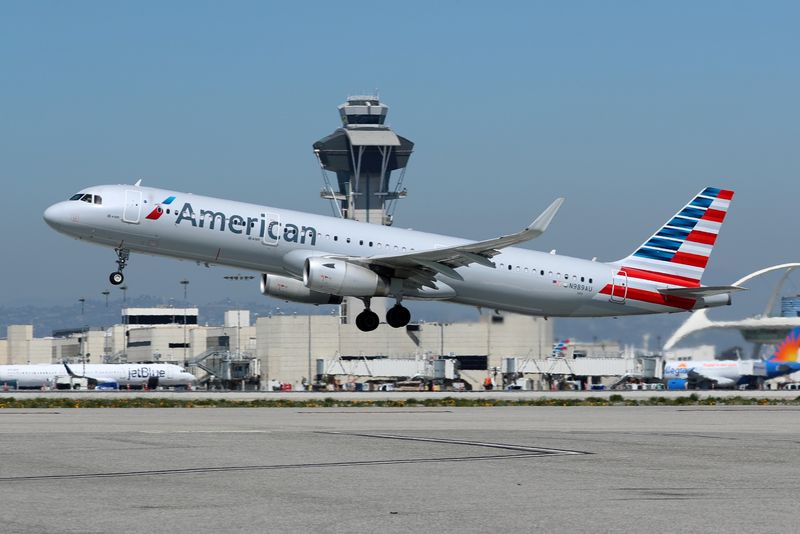By Rajesh Kumar Singh
CHICAGO (Reuters) -Airlines are back. That's the message major U.S. carriers are sending investors after grappling with coronavirus-induced uncertainty for two years.
With travel demand roaring back after a setback due to the Omicron variant of the virus early in the year, American Airlines (NASDAQ:AAL) Group, United Airlines and Alaska Air (NYSE:ALK) Group Inc on Thursday said their revenue in the current quarter would surpass pre-pandemic levels even as their capacity remains below that of 2019.
As a result, they all expect to be profitable in the quarter through June. Last week, rival Delta Air Lines (NYSE:DAL) also forecast a return to quarterly profit, citing "historic" high bookings.
"A pent-up demand wave for air travel is unraveling the long-term doom-and-gloom sentiment around major airlines," said Colin Scarola, vice president at CFRA Research.
The pace of recovery in demand as well as the bullish outlook have helped airline shares pare losses suffered since the onset of the pandemic. The NYSE Arca Airline index is still down 32% from its levels in mid-February 2020 -- but has gained 37% since early March.
CFRA on Thursday lifted its 12-month target price for United Airlines Holding Inc's shares by 37% to $63 after the Chicago-based carrier said it is on course to post the highest quarterly revenue in its history.
DEMAND DRIVERS
While the surge in bookings is largely driven by leisure travelers, carriers said office repoenings and easing border restrictions have bolstered the outlook.
American Airlines Group Inc, for example, said revenue from corporate and government travel as a percentage of 2019 levels increased by 27 percentage points in the quarter through March from the previous quarter.
"Corporate bookings are the highest that they've been since the onset of the pandemic," Chief Executive Robert Isom told investors on an earnings call. "We expect that to continue as more companies reopen their offices."
United expects a 25% growth in its trans-Atlantic traffic this summer. Even parts of Asia are rebounding, the airline said.
The booming demand is also helping carriers deal with soaring fuel costs, which have more than doubled in the past year.
Fuel is the industry's second-biggest expense after labor, but major U.S. airlines do not hedge against volatile oil prices like most European airlines. They typically look to offset fuel cost increases with higher fares.
CAPACITY CONSTRAINTS
Airline fares are up more than 50% year-on-year, according to data from research firm Cowen. United, which is passing along a majority of its fuel cost to customers, said the demand for business, leisure and cargo traffic remains strong despite higher ticket prices.
Capacity constraints at carriers due to staffing shortages and delays in aircraft deliveries mean demand is outpacing supplies, boosting the industry's pricing power.

Some analysts are concerned that rising fares and surging inflation could dent travel spending. But United Chief Executive Scott Kirby (NYSE:KEX) said a deepening pilot shortage in the country will make it harder for most airlines to realize their capacity ramp-up plans, boosting the industry's total revenue per seat.
"You put all that together, and we feel very bullish," Kirby said on the company's earnings call.